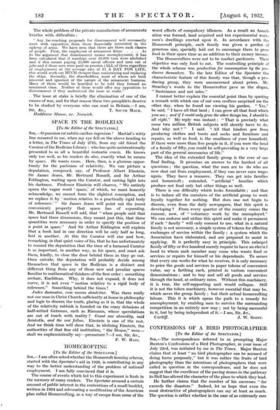HOMECROFTING
[To the Editor of the SPECTATOR.] Sca,—I am often asked whether the Homecroft housing scheme, started with the Spectator's aid in 1926, is contributing in any way to the better understanding of the problem of national employment. I am fully convinced that it is.
The course of events which led to this experiment is fresh in the memory of many readers. The Spectator aroused a certain amount of public interest in the contentions of a small booklet, written in 1924 and advocating a modification of the American plan called Homecrofting, as a way of escape from some of the
worst effects of compulsory idleness. As a result an Associ- ation was formed, land acquired and ten experimental work- men's dwellings erected upon it. In accordance with the Homecroft principle, each family was given a garden of generous size, specially laid out to encourage them to grow food in their spare time as an addition to their money income.
The Homecrofters were not to be market gardeners. Their objective was only food to eat. The controlling principle of the whole scheme was production for consumption by the pro- ducers themselves. To the late Editor of the Spectator the characteristic feature of this family was that, though a pro- ducing group, they were unconcerned about prices. Mr, Strachey's words to the Homecrofter gave us the slogan, "Sustenance and not sales."
I cannot better explain the essential point than by quoting a remark with which one of our own crofters surprised me the other day, when he found me viewing his garden. "Yes," he said, "I have all that land ; I can grow all that food which you see ; and if I could only grow the other things too, I should be all right." My reply was instant : "That is precisely what some two million British subjects will shortly have to do. And why not ? " I said. "All that hinders you from producing clothes and boots and socks and furniture and repairs, as well as food, is the smallness of your household. If there were more than five people in it, if you were the head of a family of fifty, you could be self-providing in a very large part of the general necessaries of life."
The idea of the extended family group is the core of our final finding. It promises an answer to the hardest of all questions ; the question, what the men are to do who are now shut out from employment, if they can never earn wages again. They have a resource. They can get into families and homecroft ; extended, " artificial " families which produce not food only but other things as well.
There is one difficulty which looks formidable ; and that is to induce all the members of the artificial group to work loyally together for nothing. But does one not begin to discern, even from the daily newspapers, that this spirit is developing ? From every quarter of the country comes the rumour, now, of "voluntary work by the unemployed." We can endorse and utilize this spirit and make it permanent if each " family " will only consent to use, what in a natural family is not necessary, a simple system of tokens for effecting exchanges of service within the family ; a system which the Association have elaborated, and are prepared to assist in applying. It is perfectly easy in principle. This enlarged family of fifty or five hundred merely require to have an electe I head to whom each member may come who wants food or services or repairs for himself or his dependants. To secure that every one works for what he receives, it is only necessary to price the goods and services in paper tokens of convenient value, say a farthing each, printed in various convenient denominations ; and to buy and sell all goods and services through the head, at ordinary rates. Without this machinery, it is true, the self-supporting unit would collapse. Still it is not the token machinery, however essential that may be, which saves the group family ; but their actual homecrofting labour. This it is which opens the path to a remedy for unemployment, by enabling men to survive the surrounding competition in an entirely new way ; not by being successful in it, but by being independent of it.—I am, Sir, &c.,


























 Previous page
Previous page